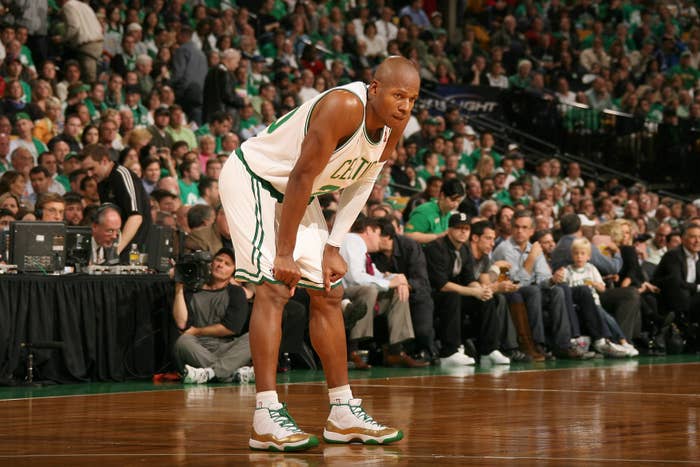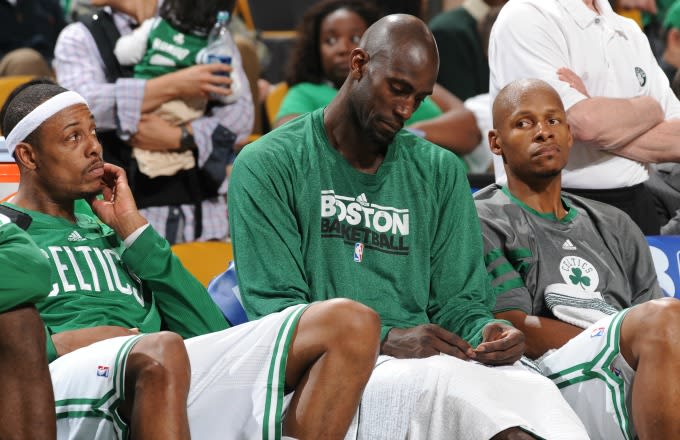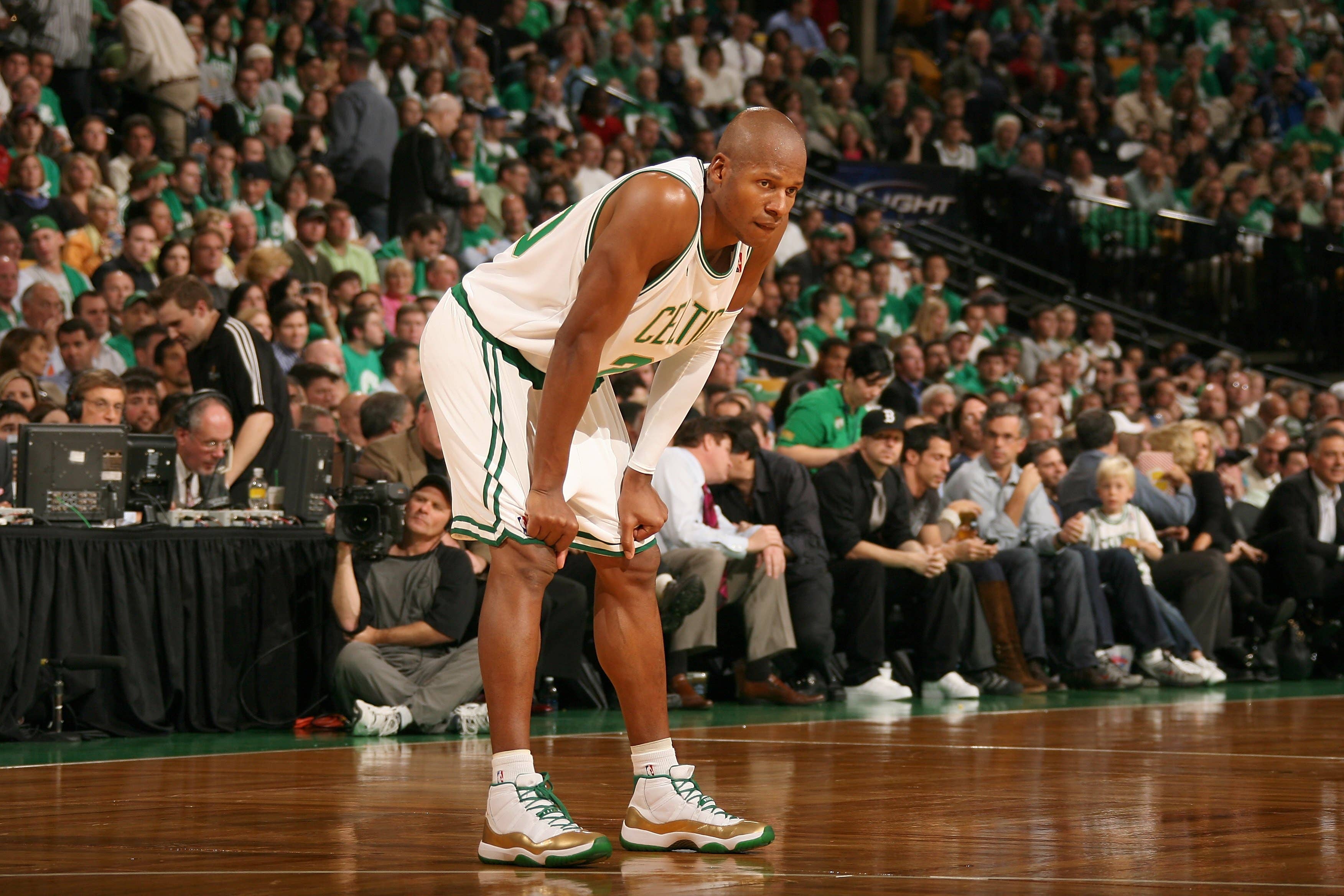
Ray Allen played his last NBA game in 2014, but he still looks, at age 42, like he could give someone minutes (and buckets). Over the past few years there were countless rumors of comebacks, but now, as a Hall of Fame finalist, Allen is contentedly retired, a stay-at-home dad to burgeoning young athletes of his own.
In the meantime, Allen’s written a memoir, “From the Outside,” which released this week. It covers everything, from his army brat upbringing to his years in the Big East, the historic ‘96 Draft, and of course his championship seasons in Boston and Miami.
Allen, a thoughtful and methodic player for his entire career, carries this over into both his writing and his conversation. And while talk about the book has centered primarily around his estrangement from his old Boston Celtics teammates—and particularly the seemingly everlasting ire of Rajon Rondo—Allen is able to take a broader view on this, and life in general. We sat down with Allen at the NBA Store in New York to talk about the Celtics, yes, but also whether he’d like to get back involved in the NBA in some way, and his meticulously organized—and expansive—collection of Air Jordans.
(This interview has been edited and condensed.)
Whenever we saw each other towards the end of your career, you always had a book with you. Did any you read help inspire you to write your own?
I always knew that [Michael Jordan] wrote a book. And I read that a long time ago, like when I first got in the league. And I knew that was great and he was putting stuff out there, he was talking about when he played baseball. There was nothing in particular that I read, obviously books, to be able to be an author and tell your story—we tell our story because we have a voice ultimately giving us a platform. And that’s all I wanted to do was be able to share what I dealt with and what I went through in my life to be able to give them [gestures towards his children] something that they can look back on. Because it’s crazy, even through this process, there’s so much that I forgot. And you get to talk about it and you get to reminisce. You catch up with old friends and share stories. That to me is, it is therapy and it’s certainly nostalgic.
Is this something you knew you were going to do early in your career?
Always. My second year I was with a guy, we actually wrote a book. And I have the pages for it but I never published it—I don’t even know where it is right now. We had a couple hundred pages, and I need to dig and find it, because it, what you talked about back in the mid-’90s, it would give a rare perspective.
things were difficult my last year in Boston in the locker room, but I don’t know how or why it started
I know you told a story in the book about the ‘96 Draft. Did you know in the moment how big that draft was? It’s still talked about as one of the best drafts ever.
No. And the only reason that it’s significant is because you look back with hindsight on the careers that guys had. There’s no telling. But we were a good group of guys coming out of college, and we didn’t settle, we continually wanted to be better.
That whole year was historic—you were in the ‘97 Dunk Contest, and that ‘97 All-Star Game was the one in Cleveland where they celebrated the 50 best players of all time. What was that weekend like?
It was certainly interesting being in the dunk contest, because I always said I would get in the dunk contest—that was one thing I wanted to cross off my list. And it was perfect timing because I was young, and I could jump. So I didn’t understand the relevance—I saw all these great players, but never understood what it meant to be able to be a part of this history, these guys that—they were like old men to me. And now I’m in that category, we’ve been around for so long. So being an All-Star was so far from my memory at that moment, so it’s certainly been a wonderful ride.
The next thing in your career would be Hall of Fame. Have you started thinking about that?
Well, I’m a finalist so it’s hard not to think about it. You think about where I come from, what I’ve done and all the worrying that I’ve had over the course of my life it seemed like everywhere, every corner I was always stressed out about something, from my mom saying I needed to get the ball more—this goes back to being 12 years old, like “they’re not passing you the ball enough!” That went on through high school, that went on through college, went on through the NBA. And yet still you just keep plugging away at it, trying to figure out—regardless of what you may think the narrative is, you still have to get up and do your job. It’s like that scenario when someone is mad at work, so what they do is they say “well I’m coming in later tomorrow.” You think you’re hurting the people at work but you’re actually hurting yourself. So me, I never self-sabotaged, I always knew if there were issues that I had with a coach or a teammate, I just knew you gotta go in there and plug away at it and figure out how to get better, don’t sacrifice your own well-being because someone else is dissatisfied or disgruntled.
I know you talked about the Rajon Rondo stuff, the Celtics. Do you want to see a healing with all that and have it all be OK at some point?
So much speculation has been made over the relationship, but we were always brothers, we won together, that’s pretty much how it’s always been for me. Obviously when I left to Miami, things went sour. And things were difficult my last year in Boston in the locker room, but I don’t know how or why it started. I still remain, as a Celtic, as a person who knows and cherishes those relationships that we had—I’m right here in front of you knowing that I’m only who I am based on what I gave to them and what they gave to me. So I don’t harbor any ill will. Like I said, when I was in Miami, yes they were disappointed that I left, and that’s OK to feel that way, because I’m no longer on their team. But, like we all know in professional sports, we have to decide what’s best for our families and best for our careers, and you know, we’ve all seen that happen—we’ve seen guys get traded and we’ve seen guys move on through free agency, and that’s within everybody’s rights. That was no different in my situation.
When you saw all the reaction to Kevin Durant going to Golden State, did you identify with that?
Well, I tried to explain to people as much as people had negative things to say about KD, I said “Guys, he’s a free agent, he can decide to go wherever he wants. That’s his choice.” You get traded somewhere where you do not want to go, that’s not your choice, you have no control over that. You know, selfishly fans in their minds, they think certain things should happen in certain ways, and they decide it for themselves and that’s OK, but don’t crucify him or say he’s a bad person, or you start burning jerseys or calling the guy names—it’s his career. We all have those choices.
What do you want to do next? What do you want to do now? Do you still want to be involved in the NBA?
Well, you see these people in this room are my closest loved ones, and it’s hard to be so far away from them so often. So it is tough to jump out there and get back into the NBA lifestyle because it requires long hours and very consistent days and weekends where you’re away from your family. That’s if, depending on the administration side or even coaching. They’re my greatest legacy I believe, because they’re going to go off in so many directions and I need them to understand what it takes to be consistent, be a good person, and give something to the world, because we all get something from it. So my wife and I, we have a restaurant in Miami where we’re trying to give organic fast food to people, we’re trying to grow that, trying to teach people. Sometimes we’re in a bad spot, but you have to figure it out, keep your head above ground and just keep movin’. You just continue to try and motivate kids and inspire them to be better than yesterday.

You were someone with a very regimented schedule and a very strict work ethic in the NBA, is that something that carried over when you retired, do you still have a lot of structure in your days?
Well, it’s yes and no. I still work out, I still run, my competition is golf. But my eating is very disciplined, what I eat, because that is half the battle. You can’t go through what we’ve gone through, in the 25 years that we’ve been playing sports, and just drop everything. We have to be consistent with our bodies, and for us as athletes we’re more prone to tougher times ahead if we don’t take care of our bodies. So I do everything I can to stay on top of it. I know it’s tough—it’s different when somebody’s crackin’ that whip, you gotta be here at this time, your body fat has to be this much, so when you can let go of it you try to, but now I try and be just accountable to myself. Because I owe it more to myself than I did to any coach or organization.
Do feel any itch to still play?
I’ve felt the itch, and it’s something I’ve always loved, but nothing takes me away from what I’m doing now because I stay busier I think than I have been. I know I still can play, but you can see it’s such a young man’s game now.
You have something like the Big 3—your old teammate Rashard Lewis tore it up last summer.
Yeah, Rashard is doing great out there. It looks fun, they enjoy it, but again for me, it requires me to be gone in the summertime when they’re home the most. Do I want to be consistently flying out every single weekend when—I know they can travel at times, but…I guess I’ve seen so many coaches that I’ve had, with kids that called them “coach.” And I want my kids to see me as their dad and know that I was always with them as they grew up. That’s always been important, to be in their life and to watch them grow up now and teach them the nuances of life and basketball and all sports, because my kids play almost every sport.
They play like you?
I’ll tell you what, what I’ve seen this past year it’s incredible what they’ve done, with their growth. You can see their love for basketball, for cross-country, for football. They truly are athletes. And they will go however far they decide to go, however far they apply themselves. And I try not to be the parent who’s always telling them “you’re doing this right” or “you’re doing this wrong.” I’m always there. My 11-year old, he just started asking me to come shoot. I wouldn’t come outside until he asked me. Because I don’t want it to be about “come on Walker, let’s go shoot.” This is your life now. You guys now have to fulfill your dreams and start your story where in 30 years you write a book. So now what it is that you’re gonna say that you did? You gotta get me off the couch. [Laughs.] Don’t let me be the sole motivator behind it.
Last thing, I know the last time we talked you said you had something like 3,000 pairs of Air Jordans. Since the last time we talked, have you started thinning it out, or sorting it out?
[Long pause] No. Where’s my phone? [His wife passes his phone and he finds a photo.] This is just, like…It’s very organized.
Do you know where everything is? If I asked you about a specific pair you could find it?
Yup, I know where everything is. I have a closet, or a section of my closet, where I have 1 through 30 in green and white Jordans, green, white and gold. They haven’t been in the stores, nobody has them, they’re just, 1 through 30 and they’re mine.

